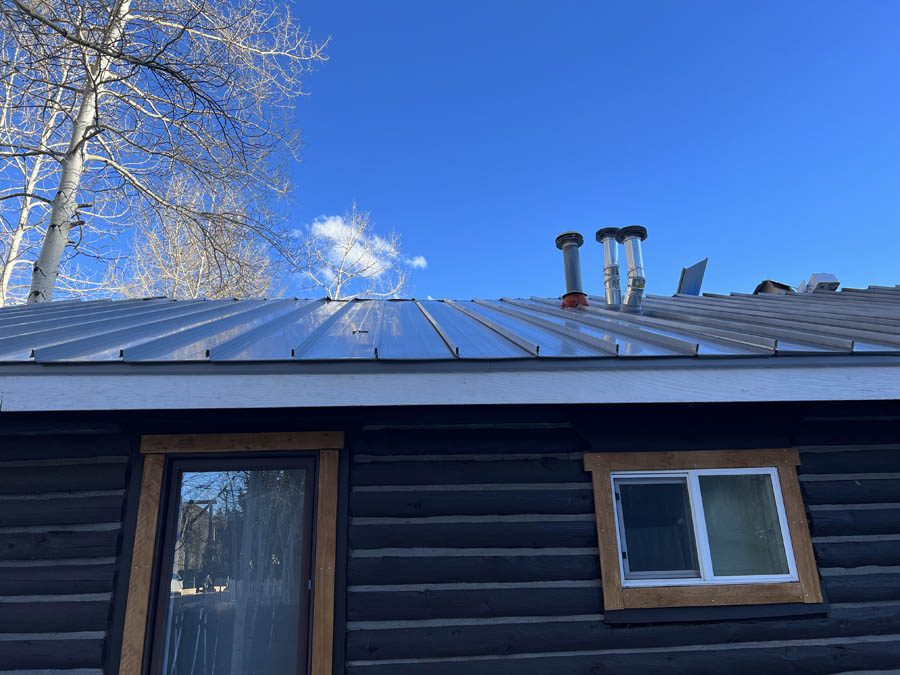Metal Roofs Vs. Asphalt shingle roofs:
A comprehensive comparison
As a roofing contractor based out of Colorado, we often meet our customers during stressful times. Their home or business has often been damaged by severe weather, and now they are in the middle of negotiations with insurance companies and scheduling contractors for repairs. This doesn’t even consider the decisions that must be made during a roof replacement, including color and design choices. Choosing the right roofing material will affect your property’s long-term comfort, protection, and value. We have seen just about every roofing system around. They all have advantages and disadvantages, so how do you choose the right one? It helps to understand the critical differences between the systems. Let’s look at two widely used options: metal and asphalt shingle roofs.
Many factors, such as durability and lifespan, should be considered when replacing your roof. In this article, we are going to discuss the following factors that will likely affect your final decision:
- Durability
- Ease Of Installation
- Cost Consideration
- Environmental Impact
- Impact on Curb appeal
- Maintenance and repair needs
When choosing between these two popular roofing materials, it’s essential to consider your budget, climate, and long-term goals. This will help you to make an informed decision that best suits your property’s needs.
The battle of durability
Metal roofs are known for their exceptional longevity, often lasting 40 to 70 years or more! They can brave harsh weather and require minimal maintenance. However, they can be prone to denting if something heavy falls on them or during large hail storms. On the other hand, asphalt shingle roofs are budget-friendly initially but typically only last 20 to 30 years. Additionally, they are more vulnerable to extreme weather conditions and demand regular maintenance.
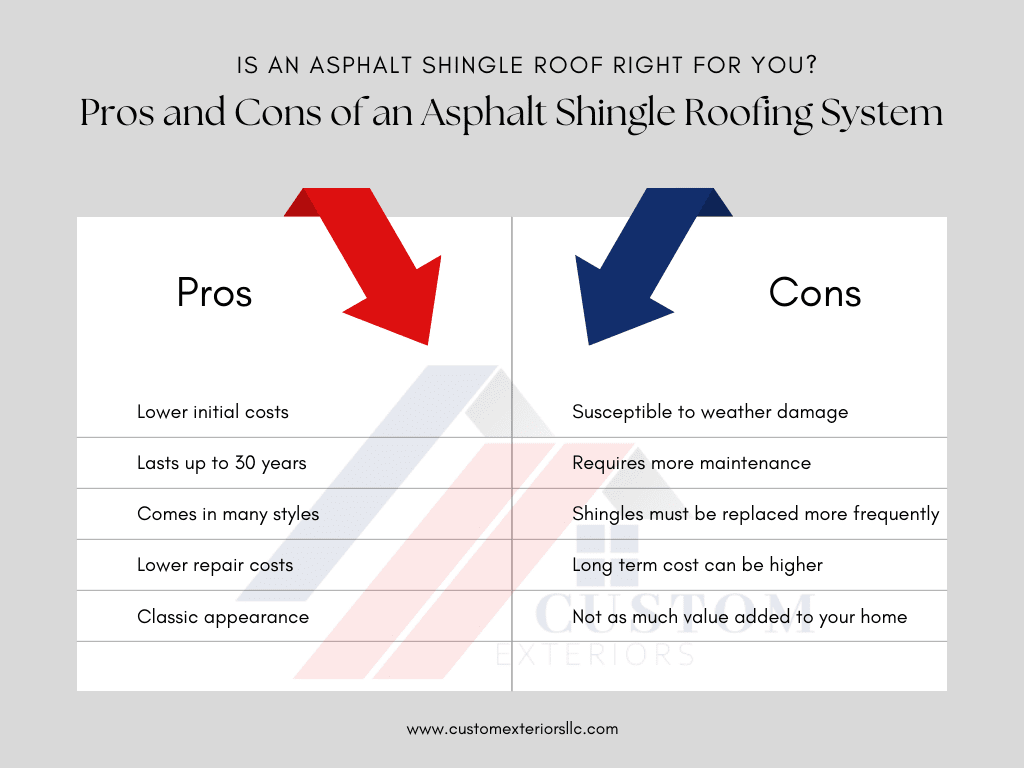
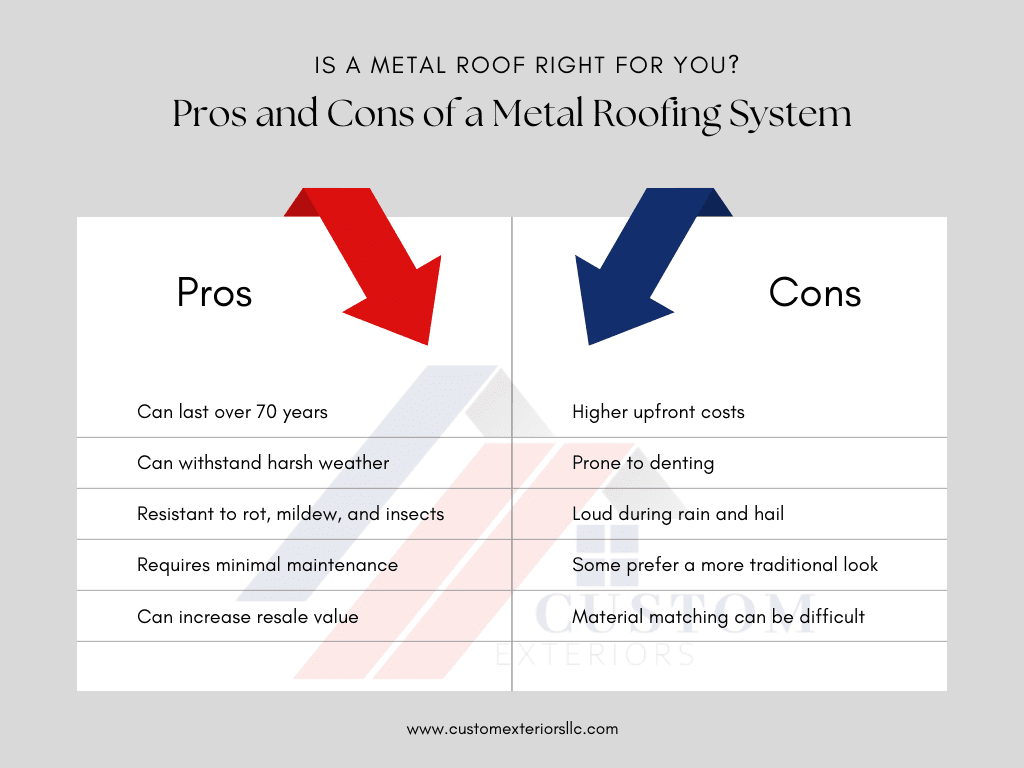
Metal Roofs: Built to last
Metal roofs are known for being quite durable, so they are often considered a long-term investment. When properly installed and maintained, metal roofs can last up to 70 years, if not longer. This impressive lifespan is due to the basic make-up of metal. Metal roofing materials, such as steel, aluminum, and copper, naturally resist wear and tear caused by weather exposure and age.
One of the standout features of metal roofing is its ability to withstand a wide range of harsh weather conditions. Snow and ice typically slide off a metal roof more efficiently, reducing the risk of ice dams and the associated water damage during cold winters. They also won’t rot, warp, or crack and cannot be damaged by mildew and mold. This resilience means fewer maintenance requirements and lower long-term repair costs.
It’s worth mentioning that while metal roofs are incredibly durable, they can be dented if something heavy, like a tree limb, falls on them or during extreme hail. However, generally speaking, metal roofing is quite difficult to damage.
Asphalt Shingle Roofs: A dependable option
Asphalt shingle roofs are not as durable as metal roofs. However, with decent long-term maintenance, they offer a respectable life span of 20 to 30 years. It is important to note that the lifespan of an asphalt roof can vary significantly depending on climate, weather exposure, shingle quality, and maintenance.
Asphalt shingles are a popular choice due to their affordability. While they have many desirable qualities, it’s crucial to consider their limitations. While they can hold up well in mild to moderate weather conditions, they are more susceptible to damage from severe weather events like hurricanes, hailstorms, and high winds. Over time, the asphalt shingles can become brittle and crack due to prolonged exposure to the sun’s ultraviolet (UV) rays, potentially leading to leaks. With this in mind, before choosing your roofing material, consider the weather conditions in your area. Homeowners in areas prone to severe weather may benefit from the long-term investment of a metal roofing system.
Asphalt shingles can deteriorate quickly in regions with extreme temperature fluctuations. In areas prone to heavy snowfall, the weight of accumulated snow and ice can cause damage to the shingles and surrounding roof components.
To maintain a long lifespan with your asphalt shingle roof, homeowners must be diligent about regular roof inspections, repairs, and occasional replacements of damaged or missing shingles. This ongoing maintenance, while necessary, can add to the long-term cost of an asphalt shingle roof.
The installation process
Understanding the installation process of metal and asphalt shingle roofs is crucial to making an informed choice for your home. Both options have aspects of installation that can impact your budget and timeline.
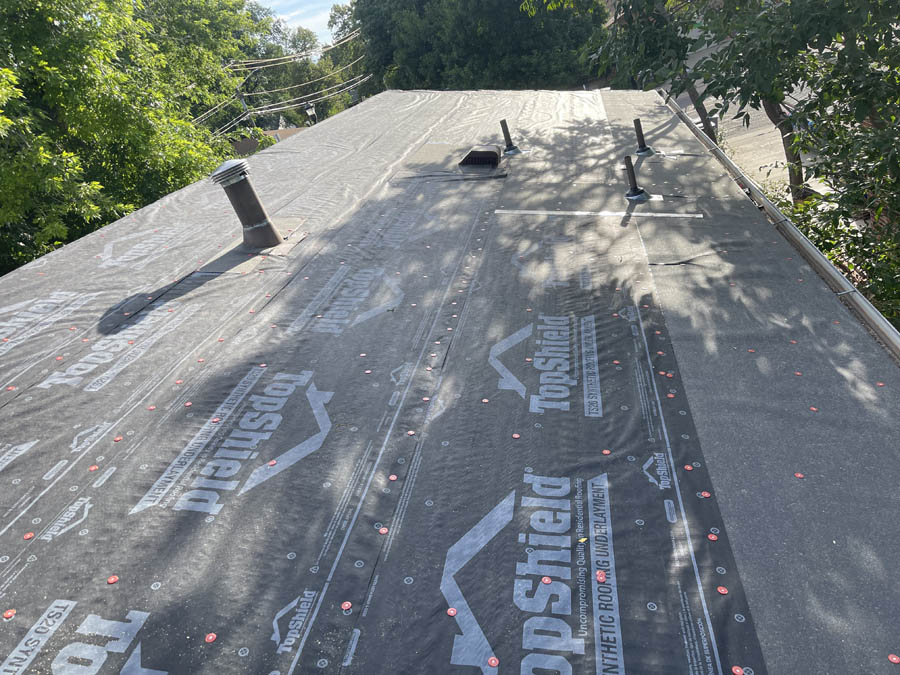
Metal Roofs: More complex with more reward
Metal roof installations typically involve more complexity than asphalt shingle roofs, but the benefits can outweigh the challenges.
After checking the roof decking for any signs of damage, the installation process begins using an underlayment like ice-and-water shield. Layers are overlapped and laid down wrinkle-free. Metal panels are then often cut to the length of the roof. This avoids seams in the roof, which can be a source of potential leaks. The panels are then stuck to closure strips and attached to the roof. The panels and trim pieces are installed with screws installed in a way designed to ensure the roof remains watertight. During installation, the panels are overlapped as an additional way to prevent roof leaks. Trim pieces and ridge cap are then attached to the other roof components like your ridge, gable, and eave. Metal roof installations often require professional installation because their installation methods are more complex.
When you replace your roof with a metal roofing system, an experienced roofer will be able to install your new roof efficiently. This means less disruption to your daily life during the installation process. This efficiency can translate to short installation times. However, because of the specialized knowledge required to install your roof, your labor costs can be higher than with an asphalt roof replacement. Additionally, incorrect installation can result in issues like leaks or rust over time. Therefore, when choosing a metal roof, it’s essential to hire a qualified roofing contractor with experience in metal roofing installation.
While metal roof installation may have a few additional considerations, the longevity and durability of the roof make it a worthwhile investment.
Asphalt Shingle Roofs: Simple and familiar
Asphalt shingle roof installation is generally more straightforward and familiar to most roofing contractors. The installation process for asphalt shingle roofs is more straightforward and requires fewer specialized tools than metal roofs as well. Most roofing professionals are qualified to install asphalt shingle roofs. The installation of asphalt shingles is typically faster than metal roofs. The process of deck inspections and underlayment is similar. However, asphalt shingles are nailed to the surface of the roof. When installing asphalt shingles, knowledge of required nail patterns and shingle layout is essential.
Proper installation of roof vents and flashing is essential for preventing leaks in the long term. Ensuring these components are correctly installed may require extra attention. Regardless of your roofing material choice, working with a reputable roofing contractor specializing in your selected roofing material is crucial to ensure a successful and long-lasting installation.
Cost Considerations
When replacing your roof, understanding the costs associated is a key factor in making an intelligent choice that meets your needs and your budget, not just now, but in the future as well.
Metal Roofs: A Long-term investment
-
Upfront cost:
Metal roofs usually come with a higher initial price tag compared to asphalt shingle roofs. This higher upfront cost can be a concern for homeowners with tight budgets.
-
Long-term savings:
While you might spend more upfront, they often become more cost-effective over time. Why? Because they last longer, typically 40 to 70 years or more. This means fewer replacement costs over the life of your home.
-
Resale Value:
Metal roofs can also increase your home's resale value. So, if you plan to sell your house down the road, you might recoup some of the initial investment.
Asphalt Shingle roofs: Budget-friendly upfront
-
Initial affordability:
Asphalt shingle roofs are known for their lower initial cost. If you're on a tight budget, they can be an attractive option because they aren't as expensive upfront.
-
Shorter lifespan:
It's important to note that asphalt shingle roofs typically have a shorter lifespan, ranging from 20 to 30 years. This means you'll likely need to replace them more often, which can add up in the long run.
-
Resale Value:
While asphalt shingle roofs are more budget-friendly, they may not add as much value to your home when you decide to sell compared to a metal roof.
When thinking about cost, you’ll need to balance your immediate budget constraints with your long-term financial goals. Metal roofs may require a larger initial investment, but their durability and potential energy savings can make them a wise financial choice in the long run. On the other hand, asphalt shingle roofs are more affordable upfront, making them a suitable option if you need to manage your costs in the short term. Weigh your budget and future plans carefully and make an informed decision about your roof replacement.
The environmental impact
Making eco-friendly choices is increasingly important. The production and shipping of both systems do have a carbon footprint. However, metal roofing materials are often recyclable at the end of their lifespan. In addition to traditional recycling methods, recently, used metal roofing has become a stylish wall covering that is highly in demand. Additionally, because of the reflective properties of metal roofing, it has the potential to reduce the energy costs of the home.
Asphalt shingles may contain recycled materials and can sometimes be recycled. However, because they don’t serve as well to reflect the sun’s heat, they contribute to the urban heat island effect. Additionally, they are more energy-intensive to manufacture.
Curb appeal
The appearance of your roof plays a surprisingly significant role in the overall look and curb appeal of your home. So, when choosing between metal and asphalt shingle roofs, it’s essential to consider how each material will look with your home’s style. Some things to consider when choosing the best match for your home are:
- Metal roofs offer a wide range of styles, colors, and finishes, allowing for a high degree of customization, from a sleek, modern look to a more traditional style.
- In addition to their versatility, modern metal roofs can be designed to mimic the appearance of natural roofing materials such as wood or slate.
- For homeowners looking to achieve a contemporary or industrial look, metal roofs often fit seamlessly into this style, giving your home a sleek appearance.
- Asphalt shingle roofs have a timeless, classic appearance that many homeowners find appealing because of their ability to compliment most architectural styles.
- While not as versatile as metal roofs, asphalt shingles do offer a variety of colors and styles to match or contrast with your home's exterior.
- Asphalt shingles enhance the warm and inviting character of your home. They are an excellent fit for cozy or rustic homes.
When choosing a new roof, the most significant impact is achieved by considering your home’s architectural style, personal preferences, and even the roofs of surrounding homes and buildings. Metal roofs provide a contemporary and customizable look, ideal for those seeking a modern appearance. On the other hand, asphalt shingle roofs offer a timeless and classic charm, making them a reliable choice for homeowners who prefer a more traditional look.
It’s important to remember that your roofing decision should complement the overall design of your home. So, take the time to explore different styles and colors, and consult with your roofing contractor for expert guidance. Ultimately, the goal is to have a roof that not only protects your home but also enhances its curb appeal and character.
Maintenance and repairs
Proper maintenance and timely repairs are essential for prolonging your roof’s lifespan. Metal roofs require minimal maintenance, usually limited to occasional inspections and cleaning. Repairs are generally straightforward, often involving patching or resealing. On the other hand, asphalt shingle roofs demand more frequent inspections and maintenance, which can become time-consuming and costly over time. However, damaged shingles can be replaced individually, reducing repair costs.
Metal roofs: Minimal Maintenance, straightforward repairs
One of the appealing aspects of metal roofs is their minimal maintenance requirements. Regular inspections to check for loose fasteners, damaged sealant, or debris in valleys are usually sufficient to keep your roof in good shape. Metal roofs are highly resistant to common roofing issues like rot, mildew, and insect damage, reducing the need for extensive maintenance. If your metal roof does require repairs, they are generally straightforward and can often be handled by a professional roofing contractor. Typical repairs include patching mall areas or resealing seams and fasteners.
However, it’s important to note that finding matching materials for repairs can be challenging if your metal roof is older, as the specific material and color may no longer be available. This could cause an inconsistent look across your roof.
Asphalt Shingle roofs: Regular maintenance and repairs
Asphalt shingle roofs require more regular maintenance than metal roofs. Routine inspections are essential to identify damaged or missing shingles, issues with flashing, and signs of wear. Timely detection can prevent more extensive damage. One advantage of asphalt shingle roofs is that damaged shingles can often be replaced individually. This helps control costs, especially for minor repairs. While some repairs can be DIY-friendly, it’s good to seek professional assistance for complex repairs. Roof professionals have the experience and expertise to identify and address roofing issues effectively. If homeowners tackle roof maintenance themselves, their first concern should be safety. Consideration should be given to having proper safety equipment and using ladder safety and rooftop safety techniques. Physical limitations can restrict some homeowners from completing roof maintenance.
Asphalt shingles require ongoing maintenance, including shingle replacement, sealing exposed nails, and addressing issues like curling or blistering shingles. Neglected shingles can lead to leaks and water damage to your home’s interior. Some repairs, such as fixing leaks around flashings or repairing extensive shingle damage, can be more complex and costly.
Insider information
- Metal roofs are excellent at reflecting sunlight, which can reduce your home's cooling costs during hot summers.
- To achieve the level of noise reduction an asphalt shingle roof produces, metal roofs will need proper insulation and underlayment.
- A metal roof's smooth surface helps snow slide off more efficiently, reducing the risk of heavy snow accumulation and potential structural damage.
- Over time, asphalt shingles can lose their protective granules, which may lead to color fading and decreased durability.
- Some regions are prone to algae growth on asphalt shingles, requiring periodic cleaning and maintenance.
- Asphalt shingles have varying levels of fire resistance, so it's essential to check the specific product's fire rating.
In the end, the choice between a metal roof and an asphalt shingle roof is a decision that should align with your budget, aesthetic preferences, and long-term goals for your home. Both materials have advantages and disadvantages, and the right choice depends on your unique circumstances.
Before starting your roofing project, take the time to consult with a trusted roofing professional who can assess your specific needs, provide detailed estimates, and offer expert guidance. Their expertise will help you make an informed decision, ensuring your home remains safe, comfortable, and visually appealing for years.
Remember that your roof is not just a functional component; it’s a crucial element of your home’s curb appeal and overall value. By considering the insider tips provided and weighing the pros and cons of each roofing material, you’ll be better equipped to make the right choice for your home and enjoy the benefits of a beautiful, durable, and long-lasting roof. Best of luck with your roofing project!
Additional Resources:
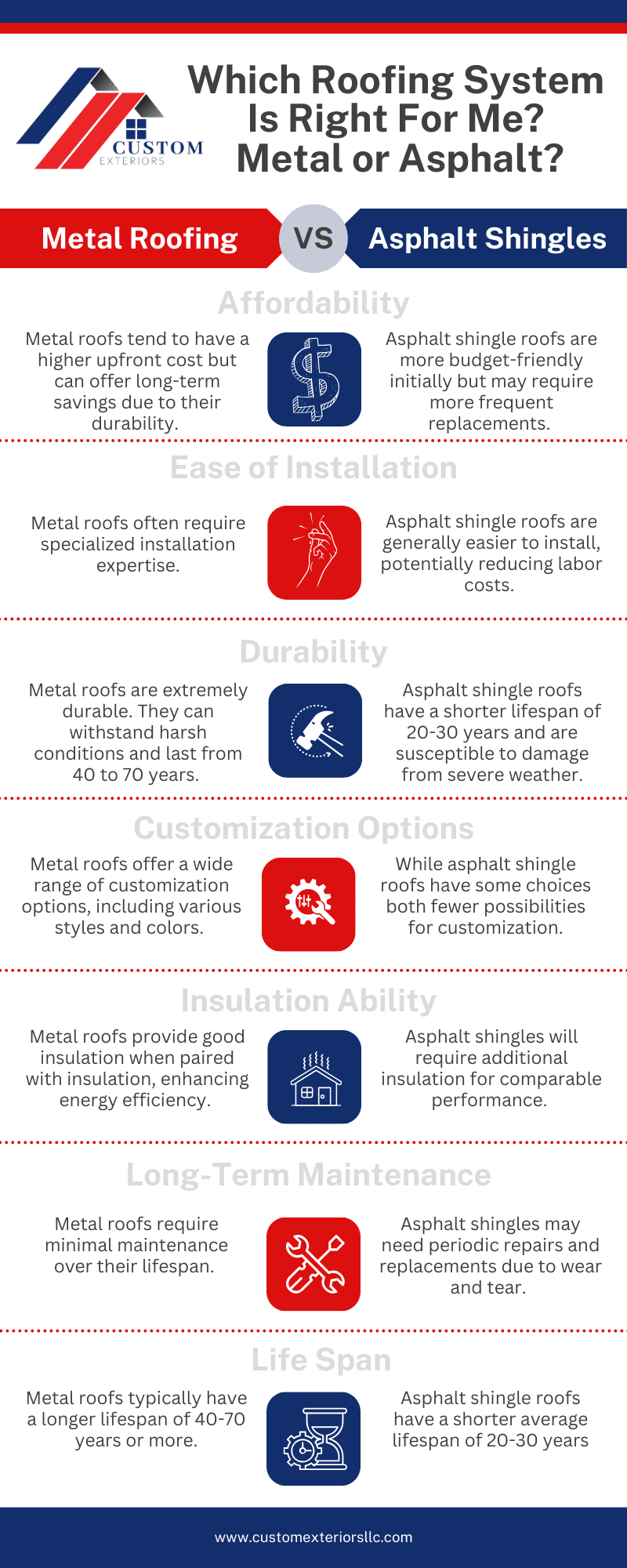
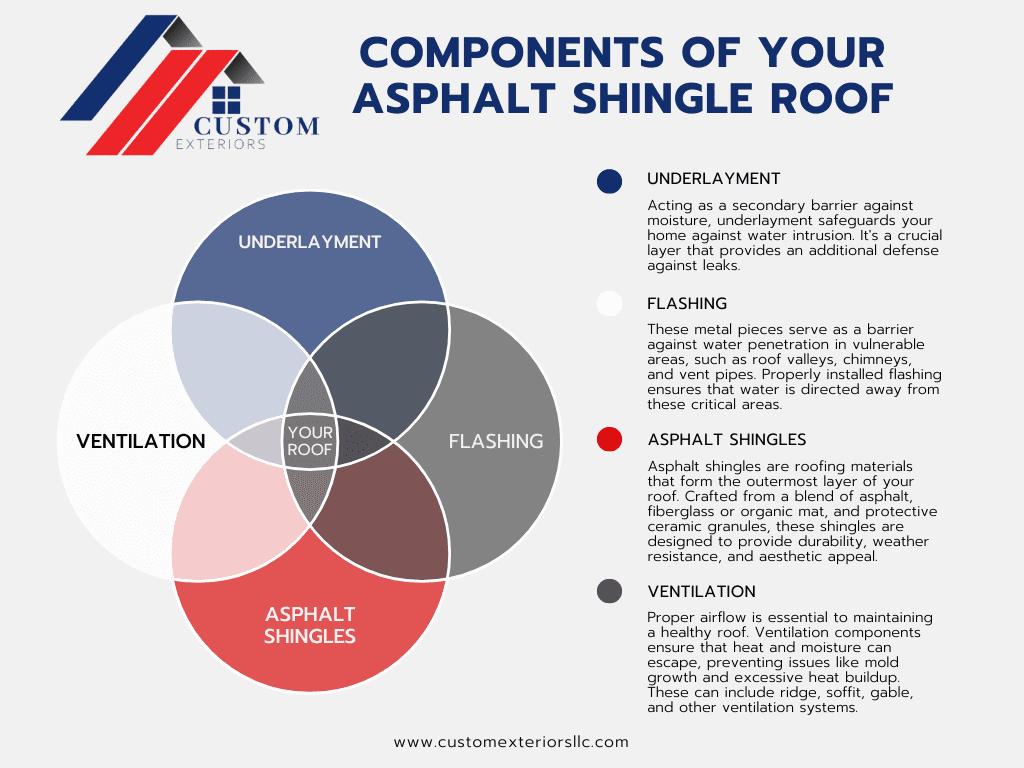
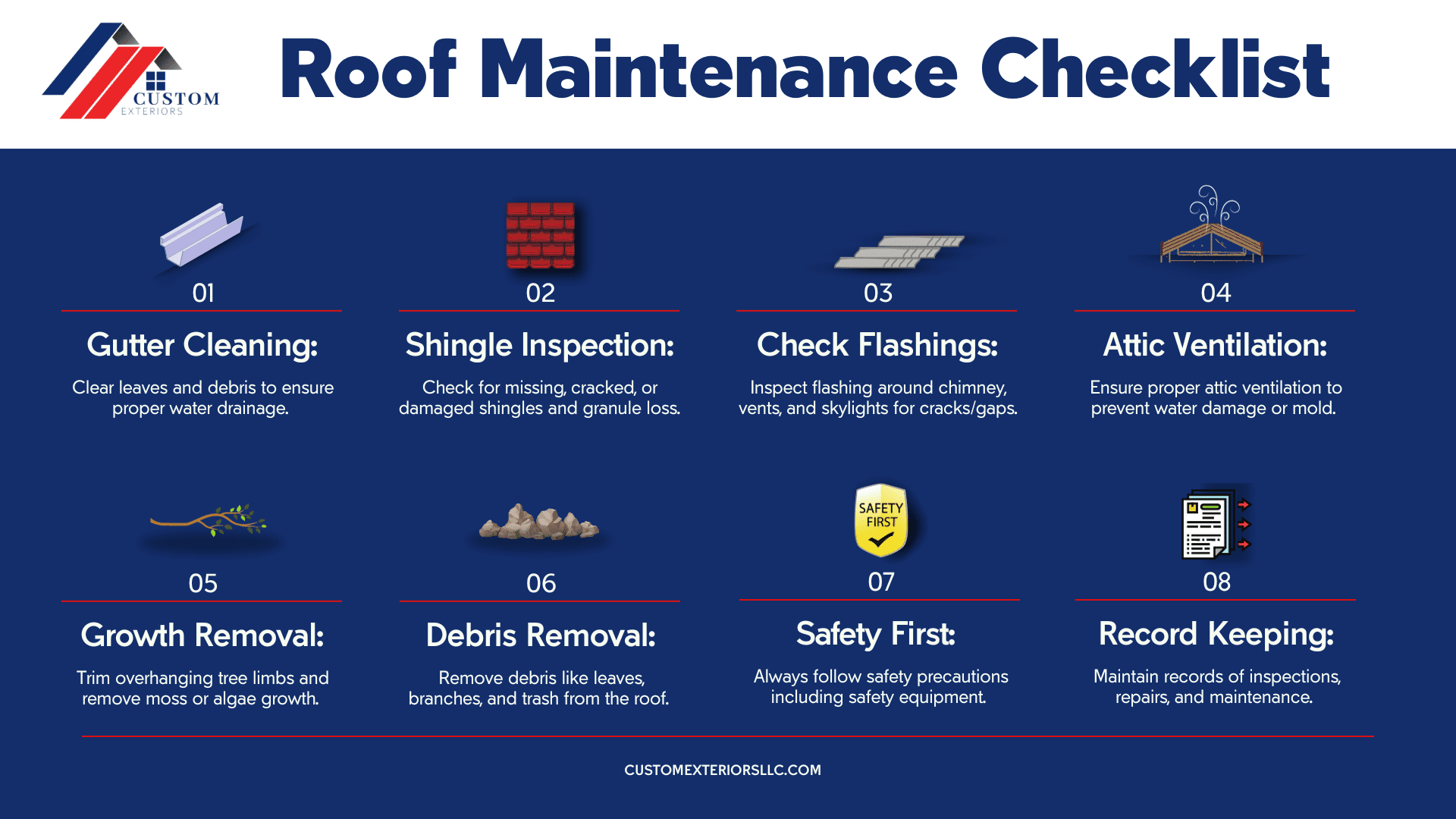
Contact Us Today
We Service and Support the Following Brands




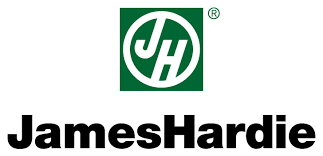
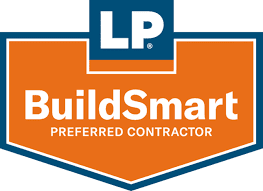



Contact
Custom Exteriors, LLC
2881 S. 31st Ave, Greeley, CO 80631
109 E. 17th St. Ste 5822, Cheyenne, WY 82001
102 S. Tejon St. Ste 1100, Colorado Springs, CO 80903
404 Broadway, Eagle CO 81631
Phone: 970-460-8714
Toll Free: 800-580-0131
Quick Links
© 2022 Custom Exteriors, LLC

